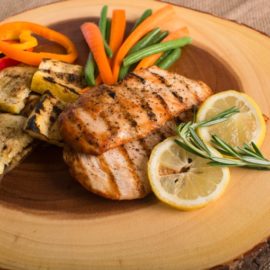

This article is an excerpt from the Shortform book guide to "Ultra-Processed People" by Chris van Tulleken. Shortform has the world's best summaries and analyses of books you should be reading.
Like this article? Sign up for a free trial here.
How do flavor enhancers in foods trick our bodies and brains? Why aren’t ultra-processed foods actually foods?
The process of manufacturing ultra-processed foods (UPF) destroys the thousands of molecules that comprise whole foods, effectively making them food-like substances. Part of the reason UPFs are so addictive despite this is because of their added flavorings.
Here’s a look at the dangers of added flavoring in UPFs.
We Think We’re Eating Something Nutritious
Van Tulleken says the added flavor enhancers in UPF trick us into thinking we’re eating something nutritious, which may cause us to eat more. This happens because we associate certain flavors with nutritious foods, even though ultra-processing destroys the nutrients in whole foods.
When it comes to nutrition, there’s a big difference between whole foods and the components that make up whole foods. Research consistently demonstrates that eating whole foods protects against cancers, heart disease, dementia, and early death. Many studies show that nutrients like vitamins and minerals are only beneficial when consumed in whole foods containing them. When these same nutrients are consumed independently of whole foods, they’re not effective. In other words, multivitamins and supplements generally don’t work for healthy people (people without nutrient deficiencies). They don’t decrease the risk of disease or death.
(Shortform note: While experts agree that supplements are often ineffective for people without nutritional deficiencies, it’s also true that many people do have nutritional deficiencies and may benefit from certain supplements. More than two billion people worldwide are deficient in key vitamins and minerals, especially iron, iodine, zinc, and vitamin A. These deficiencies are especially prevalent in low-income countries and among pregnant and lactating women and young children. Doctors and scientists generally agree that the best way to address these deficiencies is through a healthy diet of whole foods; if that’s not possible, some supplements appear to be more effective than others. The more useful ones include vitamin B12, folic acid, vitamin D, and calcium.)
The process of manufacturing UPF destroys the thousands of molecules that comprise whole foods, removing vitamins, reducing fiber and polyphenols, and generally ridding the food of micronutrients. UPF manufacturers are required by law to add certain vitamins and minerals into their food so we don’t develop deficiencies. However, the few that they add back in don’t make up for all the micronutrients lost in the course of processing. Those lost micronutrients might be precisely the ones that make whole foods so good for you.
In addition to removing micronutrients from food, ultra-processing destroys flavor molecules, so manufacturers also add in flavoring. Van Tulleken explains that added flavorings in UPF affect both smell and taste. We link smells and tastes with our past experiences with food, so these senses can signal to us how nutritious a particular food is likely to be. This means that the added flavoring in UPF may convince our brains that what we’re eating is nutritious, even if it has been stripped of all its micronutrients. In short, added flavoring in UPF may be tricking our systems of smell and taste into thinking we’re eating something nutritious.
For example, van Tulleken notes that Pringles snack chips contain the flavor enhancers glutamate, guanylate, and inosinate—molecules that normally occur in easily digestible proteins such as cooked meats. When we eat Pringles, the added flavoring signals to our brain that we’re eating something akin to a home-cooked stew. Instead, all we get is starch and fats.
(Shortform note: Pringles fans may argue that while the snacks aren’t as nutritious as a stew, at least they contain potato. However, Pringles are only 42% “potato content,” and due to ultra-processing, they’re far less nutritious than a potato. Potatoes are a good source of potassium, vitamin C, folate, and vitamin B6, as well as many other micronutrients. Pringles contain none of those nutrients except vitamin C (in about half the amount found in potatoes). They’re also high in saturated fat and contain more calories than potatoes.)
Some scientists have theorized that we’re eating more in an attempt to make up for our increasing micronutrient deficiency. This may be why UPF diets can result in malnutrition and obesity simultaneously.
(Shortform note: Research shows that, although processing removes micronutrients from food and can’t possibly replace them all, some UPF is more nutritious than others. For example, soda is high in calories and contains no healthy nutrients, but a breakfast cereal that’s high in fiber, low in sugar, and fortified with nutrients that we might not otherwise get enough of, like folic acid, can be a nutritious choice.)
UPF’s Additives Damage Our Microbiome
Plus, additives in UPF may damage our microbiome, leading to overeating and other problems.
Our microbiome consists of all the microorganisms—such as bacteria, viruses, and immune cells—that live in our body, particularly in our gut. Van Tulleken calls the microbiome the body’s largest immune organ; it’s responsible for protecting us from harmful bacteria.
Manufacturers use thousands of additives in UPF, including emulsifiers, stabilizers, leavening agents, artificial sweeteners, and artificial flavors. Our gut microbiome turns some food into beneficial molecules, but food containing additives may harm the microbiome by leading to intestinal inflammation. This can result in overeating.
Even if additives don’t cause overeating, research suggests that they can alter the balance of bacteria in the gut. This imbalance can contribute to a variety of diseases, including rheumatoid arthritis, autoimmune diseases, and even cancer and mental illness.
(Shortform note: Van Tulleken only cites one study (on mice) linking additives to microbiome damage and overeating; critics note that human microbiomes are very different from the microbiomes of other animals. However, research linking microbiome damage to inflammation indicates that certain diets high in additives may cause chronic inflammation, which is associated with many serious diseases. Inflammation is your body’s immune response to a virus, bacteria, foreign toxin, or injury. Acute inflammation is a natural part of the healing process. Chronic inflammation occurs when your body continues sending inflammatory signals even when there’s no outside danger. Eating too much of certain UPF may increase chronic inflammation by causing a gut microbiome imbalance.)

———End of Preview———
Like what you just read? Read the rest of the world's best book summary and analysis of Chris van Tulleken's "Ultra-Processed People" at Shortform.
Here's what you'll find in our full Ultra-Processed People summary:
- Why it’s so hard to stop eating your favorite chips
- How the way ultra-processed food is made harms the environment
- Ways to counteract the effects of ultra-processed food






